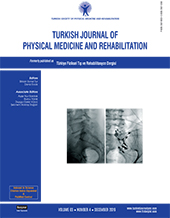The effectiveness of prolotherapy on failed rotator cuff repair surgery
2 Department of Sports Medicine, Gülhane Training and Research Hospital, Ankara, Turkey
3 Special Forces Command, Sports Medicine, Ankara, Turkey
4 Department of Orthopedics and Traumatology, Gülhane Training and Research Hospital, Ankara, Turkey DOI : 10.5606/tftrd.2020.3222 Objectives:The aim of the present study was to investigate the effectiveness of prolotherapy injections in the treatment of failed rotator cuff repair surgery.
Patients and methods: Between May 2014 and March 2016, a total of 15 patients (5 males, 10 females; mean age 49.4±10.7 years; range, 33 to 71 years) with failed rotator cuff repair surgery who had at least six months of complaints and were refractory to at least of three months of conservative methods were included. Ultrasound-guided prolotherapy injections were performed under aseptic conditions, and the patients were instructed to carry out a home-based exercise program. Clinical assessment of shoulder function was performed using a visual analog scale (VAS) for pain, Shoulder Pain and Disability Index (SPADI), Western Ontario Rotator Cuff (WORC) Index, patient satisfaction and shoulder range of motion. All patients were examined at baseline, at Week 3, 6, and 12 and at the final follow-up visit.
Results: The intra-group comparison showed that the patients achieved significant improvements at all time points, compared to baseline as measured by VAS, SPADI, WORC index, and shoulder range of motion (p<0.001). Twelve patients (80%) reported excellent or good outcomes.
Conclusion: Our study results show that prolotherapy is effective in the treatment of patients with failed rotator cuff repair surgery with significant improvements in the shoulder functions and pain relief.
Keywords : Arthroscopy, injection, physiotherapy, rotator cuff injury, shoulder pain, stiffness
















